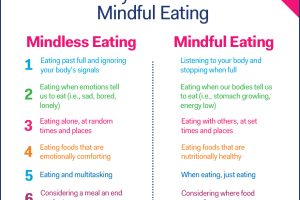Mindful Eating: A Key to Wellness and Longevity

Introduction to Mindful Eating
Understanding the Concept
Mindful eating is a practice grounded in the principles of mindfulness, which emphasizes being present and fully engaged in the moment. It involves paying attention to the experience of eating, allowing individuals to savor their food, recognize their hunger and fullness cues, and identify emotional triggers related to eating. This profound approach goes beyond mere food consumption; it’s about reestablishing a connection with what one eats and why. For example, consider someone who typically rushes through meals, distracted by their phone or television. Mindful eating invites them to pause and appreciate each bite, noticing the flavors, textures, and aroma. This practice enables a richer culinary experience, transforming meals into opportunities for nourishment and enjoyment.
- Mindful Eating: A Key to Wellness and Longevity
- Introduction to Mindful Eating
- Understanding the Concept
- Benefits of Mindful Eating
- The Science Behind Mindful Eating
- How Mindful Eating Impacts the Brain
- Research Studies on Mindful Eating
- Developing Mindful Eating Habits
- Tips for Practicing Mindful Eating
- Overcoming Challenges in Mindful Eating
- Mindful Eating for Weight Management
- Using Mindful Eating for Weight Loss
- How Mindful Eating Supports Weight Maintenance
- Mindful Eating for Improved Digestion
- Mindful Eating and Digestive Health
- Tips for Enhancing Digestion through Mindful Eating
Benefits of Mindful Eating
The benefits of mindful eating extend far beyond just enjoyment. Engaging in this practice can lead to several positive outcomes, including:
- Improved Digestion: By slowing down and chewing food thoroughly, the digestive process becomes more efficient, often leading to better absorption of nutrients.
- Weight Management: Individuals who practice mindful eating may find it easier to maintain a healthy weight. By tuning into hunger signals and practicing portion control, they can avoid overeating.
- Reduced Emotional Eating: Practicing mindfulness can help individuals identify emotional triggers that lead to unhealthy eating habits. By acknowledging these feelings without judgment, one can make more conscious choices.
- Enhanced Relationship with Food: Mindful eating fosters a non-judgmental attitude toward food. This approach helps individuals appreciate food for its flavors and textures, rather than viewing it through a lens of guilt or restriction.
Imagine sitting down to a meal without distractions, where every bite is savored. This simple yet profound shift can create a healthier relationship with food while promoting overall well-being. By embracing mindful eating, individuals can transform their approach to nourishment, leading to a more balanced and fulfilling lifestyle.
The Science Behind Mindful Eating
How Mindful Eating Impacts the Brain
Mindful eating not only nourishes the body but also has profound effects on the brain. When individuals practice mindfulness during meals, they engage different neural pathways that enhance their connection to food and the act of eating. By focusing on the sensory experience—like the taste, texture, and aroma of food—people activate the areas of the brain associated with emotion and reward, such as the limbic system. For example, when someone truly savors a piece of chocolate, their brain releases dopamine, the feel-good neurotransmitter. This not only enhances enjoyment but also encourages healthier eating habits by associating positive feelings with nutritious choices rather than just indulgent treats. Additionally, mindful eating can help reduce the activation of stress hormones, such as cortisol. By creating a calm eating environment, individuals can lower their stress levels, which, in turn, can minimize emotional eating.
Research Studies on Mindful Eating
A growing body of research supports the benefits of mindful eating. Studies have shown that incorporating mindfulness techniques into eating habits can lead to significant improvements in both physical and mental well-being. Here’s a glimpse at some compelling findings:
- Weight Loss: A study published in the journal Obesity found that participants who engaged in mindful eating lost more weight than those who didn’t practice mindfulness over a six-month period.
- Digestive Health: Research in the Journal of the Academy of Nutrition and Dietetics indicated that mindful eating practices helped participants report fewer digestive issues. This can be attributed to slower eating and better chewing, which aids digestion.
- Improved Satisfaction: A study revealed that individuals who practiced mindful eating reported increased satisfaction with their meals, which can help reduce the urge to snack mindlessly throughout the day.
Overall, the science behind mindful eating reveals that it not only changes how we eat but also how we feel about food. As individuals cultivate awareness and appreciation during meals, they can enjoy a more balanced relationship with food that benefits both body and mind.
Developing Mindful Eating Habits
Tips for Practicing Mindful Eating
Transitioning to mindful eating can be a rewarding journey filled with discoveries about food, body, and self-awareness. Here are some practical tips to help individuals incorporate mindful eating into their daily lives:
- Slow Down: Take time to appreciate each bite. Setting aside at least 20 minutes for meals can help individuals connect better with their food and prevent overeating.
- Eliminate Distractions: Create a calm eating environment. Turn off electronics, put away phones, and focus entirely on the meal.
- Engage All Senses: Notice the colors, textures, and aromas of food before taking that first bite. Engaging the senses enhances appreciation and satisfaction.
- Listen to Your Body: Before starting a meal, evaluate your hunger. Are you truly hungry, or is it boredom or stress? Pay attention to when you feel full to avoid overeating.
- Practice Gratitude: Consider the origins of your food and express gratitude for it. Acknowledging the effort behind your meal can deepen your connection to it.
For instance, someone might start selecting a meal and dedicatedly admire its vibrant colors, fresh flavors, and delightful scents before taking a single bite. Each mouthful then becomes an exploration rather than just fuel.
Overcoming Challenges in Mindful Eating
Adopting mindful eating habits can certainly present some challenges. Individuals may face habitual distractions, emotional triggers, or even societal pressures enforcing fast-paced eating. Identifying and addressing these obstacles is crucial to success. Here are strategies to help overcome those challenges:
- Set Realistic Goals: Start small. Instead of trying to shift every meal to a mindful experience at once, begin with one meal per day; gradually expand from there.
- Identify Emotional Triggers: Keep a food diary to jot down feelings associated with eating. By recognizing patterns, individuals can address emotional eating and find healthier coping mechanisms.
- Seek Support: Joining a group or finding a mindful eating buddy can provide motivation, encouragement, and accountability.
- Practice Self-Compassion: Understand that setbacks may occur. Instead of feeling guilty, acknowledge the experience, learn from it, and move forward.
In conclusion, developing mindful eating habits isn’t about perfection; it’s about making conscious and intentional choices. As individuals navigate through the ups and downs, they cultivate a healthier relationship with food—one that nourishes not just the body, but the mind and soul.
Mindful Eating for Weight Management
Using Mindful Eating for Weight Loss
Mindful eating can be a powerful tool for those looking to lose weight because it encourages awareness and intentionality in food choices. Rather than focusing on restrictive diets or calorie counting, mindful eating promotes a healthier relationship with food, which can lead to sustainable weight loss. One effective strategy is to adopt the practice of portion control naturally. By tuning into hunger cues and eating slowly, individuals are more likely to stop when they’re satisfied rather than stuffed. Here are some practical tips for incorporating mindful eating into a weight loss routine:
- Prioritize Whole Foods: Focus on nutrient-rich foods like fruits, vegetables, whole grains, and lean proteins. These foods tend to be more satisfying and can help curb cravings.
- Eat Without Distractions: Establish a routine where meals are enjoyed without screens or multitasking. This not only enhances the meal experience but also makes it easier to recognize fullness.
- Practice Chewing Thoroughly: Chewing each bite thoroughly can enhance digestion and allow more time to enjoy flavors, which helps in signaling when to stop eating.
Imagine someone who always rushes through lunch, feeling guilty about snacking later. By practicing mindful eating, they can learn to appreciate their food, leading to fewer cravings and healthier choices throughout the day.
How Mindful Eating Supports Weight Maintenance
Once weight loss goals are achieved, maintaining that weight can be the next challenge. Mindful eating plays a crucial role in this process by reinforcing healthy habits and behaviors that promote long-term success. Here are some ways mindful eating supports weight maintenance:
- Sustained Awareness: Individuals remain attuned to their hunger signals and emotions, making it easier to navigate food choices without reverting to old habits.
- Mindful Snacking: By applying mindfulness to snacks, individuals can enjoy treats in moderation without guilt, which helps prevent binge-eating episodes.
- Balanced Approach to Food: Mindful eaters often develop a non-judgmental attitude toward food, allowing for indulgences while ensuring that healthy choices remain a priority.
Consider a person who has successfully lost weight by practicing mindful eating. By continuing these habits, they celebrate occasional treats without regression, feeling empowered rather than restricted. In summary, using mindful eating for weight management—both for weight loss and maintenance—encourages a balanced and personalized approach to food. This, in turn, fosters a lifestyle that prioritizes health and well-being rather than temporary results.
Mindful Eating for Improved Digestion
Mindful Eating and Digestive Health
As individuals delve deeper into the practice of mindful eating, they may discover its remarkable benefits for digestion. Eating mindfully allows for a more profound connection with one’s body, enabling individuals to tune into the physical sensations during the process of eating. This approach can significantly enhance digestive health, as digestion begins long before food reaches the stomach. When one pays attention to the experience of eating—focusing on flavors, textures, and how food feels—several benefits emerge. For instance, slow eating improves saliva production and enzyme activation, which are crucial for breaking down food properly. Additionally, mindful eaters are more likely to chew their food thoroughly, aiding the digestive process further down the gastrointestinal tract. Here’s a quick look at how mindful eating supports digestive health:
- Reduction of Overeating: Eating slowly helps individuals recognize when they are full, preventing indigestion caused by overeating.
- Lower Stress Levels: Mindful eating encourages a relaxed eating environment, reducing stress, which is known to negatively affect digestion.
- Improved Nutrient Absorption: By taking time to chew and savor food, the body can better break it down, facilitating improved nutrient absorption.
Tips for Enhancing Digestion through Mindful Eating
To enhance digestion through mindful eating, individuals can adopt some effective strategies. Here are some practical tips that can be easily integrated into everyday life:
- Create a Calm Eating Atmosphere: Select a peaceful space for meals, minimizing noise and distractions to enhance focus on food.
- Start with a Mindful Breath: Take a few deep breaths before diving into a meal. This simple act can signal the body to prepare for digestion and promotes a sense of calm.
- Choose Foods Wisely: Incorporate fiber-rich foods like fruits, vegetables, and whole grains into meals. These can aid in digestion and promote gut health.
- Pay Attention to Chewing: Aim to chew each bite around 20-30 times. This not only allows for better digestion but can also make meals more enjoyable.
- Stay Hydrated: Drinking water mindfully—sipping throughout the meal rather than gulping—can aid digestion without overwhelming the stomach.
For example, someone might find that by intentionally slowing down and savoring their meals, not only do they become more satisfied, but they also experience less bloating and discomfort afterward. In conclusion, the connection between mindful eating and improved digestive health cannot be overstated. By incorporating mindful practices into meals, individuals can create a positive cycle that supports both digestion and overall well-being, making meals a joyful part of daily life.





